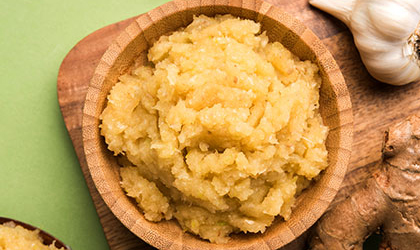
‘Antioxidant’ is a buzzword that often makes an appearance in health and wellness rhetoric. And it’s not surprising – these potent compounds are poised to defend your body from those reprehensible, DNA-attacking villains: free radicals. It’s an epic tale of good versus bad. Antioxidants have certainly had their moment of late, with many experts purporting they offer a slew of benefits for skin, cognition, eyes, mood and the heart. But do they really have the capacity to support immune defences, as so many of the claims suggest? And if so, what antioxidants are the true immune-supporting champs? Let’s find out.
How do antioxidants work?
Both normal cellular functions and external stressors, like UV rays, cigarette smoke and environmental pollution, trigger the production of nefarious free radicals. Free radicals are unstable molecules that wreak havoc with your body, damaging membranes, DNA and enzymes – or, as it’s more scientifically termed, causing ‘oxidative stress’ i. Many areas of the body are vulnerable to free radical damage, but the immune system is especially sensitive ii. The hero of the hour that jumps to your defence? Why, those do-gooders, antioxidants, of course. These little guys neutralise and eliminate free radicals from the bloodstream in a bid to keep your body functioning optimally. In most cases, however, those pesky free radicals outnumber the concentration of naturally occurring antioxidants in your body. To maintain a happy, healthy status quo, then, you need a constant supply of antioxidants from external sources, such as food.
Are all antioxidants created equally?
In short: no. Any compound that operates against oxidative stress is, technically, an ‘antioxidant’. This includes household names, like vitamins, as well as more unfamiliar faces, such as polyphenols – around 8,000 strains in total. Some antioxidants are experts at fighting free radicals, while others only excel at targeting specific parts of a cell. It can help to think of antioxidants as a police force with a deeply entrenched hierarchy. You need a chief constable, chief superintendent, chief inspector, sergeant, and constable. While all members of the team play a part, you can only fight free radicals with the chief constable. So who are they?
What antioxidants are especially good for immune function?
Vitamin C
Vitamin C – also known as ascorbic acid – is one of the biggest players in the antioxidant world. This powerhouse has an positive effect on virtually every aspect of your immune system: it supports ‘natural killer cells’ (NK) that eliminate infectious and malignant targets; ‘neutrophils’ that fight bacterial infections; ‘antibodies’ that identify and destroy invading threats; and ‘lymphocytes’ that produce antibodies iv. It fights free radicals, too, acting as a barrier against invading infections, viruses and diseases. Indeed, there’s no dearth of controlled trials demonstrating vitamin C’s capacity to reduce the severity and duration of respiratory tract infections, especially the common cold v. Since your body can’t produce vitamin C, a plentiful supply must come from your diet. Load up on citrus fruits, peppers, strawberries, broccoli, and tomatoes. Top tip: iron helps with the absorption of vitamin C, so why not partner your intake with quinoa, spinach or beans?
Vitamin E
Vitamin E is also a superstar for immunity. Not only is it the first line of defence against oxidative damage, but it’s needed for the normal function of cells in the immune system, too vi. Alongside its antioxidant credentials, vitamin E helps to reinforce the body’s resistance to bacterial and viral infections, enhance antibody concentration, and increase the production of natural killer cells (NK) in the immune system vii. A vitamin E deficiency will likely reduce the function of key immunity defenders: the B and T cells. And decreased T cell function can contribute to ‘immunosenescence’, whereby immune function decreases with age viii. You can up your intake of vitamin E by munching on sunflowers seeds, almonds, hazelnuts, pine nuts, avocado, salmon and mangos.
Beta-carotene
Beta-carotene is another powerhouse for immune function. In addition to being a precursor for the immune protector, vitamin A, this nutrient provides powerful antioxidant defences against invading pathogens. In particular, its been shown to support the lymphocytes (remember these fellas – they produce antibodies in the immune system) following exposure to free radicals ix. A raft of scientific evidence suggests beta-carotene may also increase the production of important immune defenders, B and T cells x.
We can’t discuss beta-carotene without mentioning vitamin A. Your body converts beta-carotene into vitamin A, which plays a pivotal role in protecting your body against infection. A deficiency may compromise a number of immune functions, such as the production of natural killer cells, T cells, and B cells xi. Did you know beta-carotene is responsible for the yellow, red and orange hues of certain fruits and veggies? Carrots, sweet potatoes, squash, red and yellow peppers, apricots and cantaloupe are all brimming in the stuff.
Flavonoids
Thanks to their impressive antioxidant properties, flavonoids – powerful plant pigments – provide protection from free radical damage, as well as supporting the cells that regulate your immune responses, cytokines xii. A study published in Advances In Nutrition demonstrated that flavonoids played an essential role in the immune system’s defences against respiratory tract infectionsxiii. The report established those who ate foods rich in these plant pigments were less likely to contract an upper respiratory tract infection than those who didn’t. The good news is flavonoids can be found in plenty of food groups. To ready yourself for whatever Mother Nature’s throws your way, embrace berries (strawberries, blackberries, raspberries), tree fruits (bananas, apples, pears), nuts (walnuts, pecans) and beans (soybean, fava beans), veggies (tomatoes, aubergine, onions, celery, artichokes), spices (dill, thyme), and beverages (red wine, tea).
Selenium
Selenium excels at supporting your immune system, too. This potent antioxidant keeps your immunity in check by identifying and warding off potentially harmful threats, like viruses, parasites and bacteria. What’s more, your body needs this compound for the production of ‘selenoproteins’ – selenium-dependent enzymes that help regulate your immune responses xiv. Unsurprisingly, then, a selenium deficiency has been associated with impaired immunity and an increased susceptibility to viral infections xv. You can find an abundance of selenium in Brazil nuts, fish, ham, pork, turkey, eggs, brown rice, cottage cheese and mushrooms.
Zinc
Last but certainly not least, we have to sing the praises of the antioxidant zinc – a powerful weapon for immunity. Did you know a small deficiency of this nutrient can undermine several areas of your immune system, leading to poor immune cell responses, and a reduction in T cells, natural killer cells, and antibodies xvi. No wonder it’s been heralded such superstar for combating infections! Your body doesn’t readily store zinc, so you need to eat enough of it every day to keep your mineral reserves stocked up. Meat, shellfish, legumes, seeds, nuts, dairy foods, eggs and whole grains are super-rich sources of this antioxidant A-lister.
Final thoughts
To support your immune system all year round, aim to fill up on five to seven antioxidant-rich fruits and veggies every day. Oh, and don’t forget whole grains, nuts, seeds and beans are awash in these potent compounds, too. Another secret to a happy, healthy immune system? Variety. Don’t just eat the same old grub day in day out. Look for colour. Try different flavour combinations. Get creative with grains, exotic fruits and legumes. The antioxidant burst will work wonders for your immune system – not to mention your palette.
References:
-
Bendich, A. (1993). Physiological Role of Antioxidants in the Immune System. Journal of Dairy Science, 76(9), 2789-2794.
-
Hughes, D. (2000). Dietary antioxidants and human immune function. Nutrition Bulletin, 25(1), 35-41.
-
Carr, A.C., Maggini, S. (2017). Vitamin C and Immune Function. Nutrients, 9 (11). pii: E1211.
-
Kim, J.E., Cho, H.S., Yang, H.S., et al. (2012). Depletion of ascorbic acid impairs NK cell activity against ovarian cancer in a mouse model. Immunobiology. 217(9), 873-81.
Schwartz-Albiez, R. (2012). Naturally occurring antibodies directed against carbohydrate tumor antigens. Adv Exp Med Biol. 750: 27-43. -
Wintergerst, E.S., Maggini, S., Hornig, D.H. (2006). Immune-enhancing role of vitamin C and zinc and effect on clinical conditions. Ann Nutr Metab. 50(2), 85-94.
Hemila, H., Douglas, R.M. (1999). Vitamin C and acute respiratory infections. Int J Tuberc Lung Dis. 3 (9), 756-61. -
Pekmezci, D. (2011). Vitamin E and Immunity. Vitam Horm. 86, 179-215.
-
Hechtman, L., Harris, K., Bridgeman, K. (2014). The Immune System In: Hechtman L. Clinical Naturopathic Medicine, Sydney: Churchill Livingstone Elsevier, 280-417.
-
Wu, D., Meydani, S.N. (2014). Age-associated changes in immune function: impact of vitamin E intervention and the underlying mechanisms. Endocr Metab Immune Disord Drug Targets, 14(4), 283-289.
-
Bendich, A. (1989). Carotenoids and the immune response. J Nutr. 119(1), 112-115.
-
Hechtman, L. The Immune System In. 280-417.
-
Stephensen, C.B. (2001). Vitamin A, infection, and immune function. Annu Rev Nutr. 21:167-192.
-
Pérez-Cano, F.J. & Castell, M. (2016). Flavonoids, Inflammation and Immune System. Nutrients. ,8(10), 659.
-
Somerville, V.S., Braakhuis, A.J. & Hopkins, W.G. (2016). Effect of Flavonoids on Upper Respiratory Tract Infections and Immune Function: A Systematic Review and Meta-Analysis. Advances in nutrition (Bethesda, Md.), 7(3), 488-97.
-
Huang, Z., Rose, A.H. & Hoffmann, P.R. (2012). The role of selenium in inflammation and immunity: from molecular mechanisms to therapeutic opportunities. Antioxid Redox Signal. 16(7), 705-743.
-
Linus Pauling Institute. (2018) Immunity In Depth. Available online: http://lpi.oregonstate.edu/infocenter/immunity.html [Accessed 1 Nov. 2018]
-
Larson, C.P, Roy, S.K., Khan, A.I., et al. (2008). Zinc treatment to under-five children: applications to improve child survival and reduce burden of disease. J Health Popul Nutr 26(3), 356-365.
You Might Also Like

Olivia
Olivia Salter has always been an avid health nut. After graduating from the University of Bristol, she began working for a nutritional consultancy where she discovered her passion for all things wellness-related. There, she executed much of the company’s content marketing strategy and found her niche in health writing, publishing articles in Women’s Health, Mind Body Green, Thrive and Psychologies.
View More



